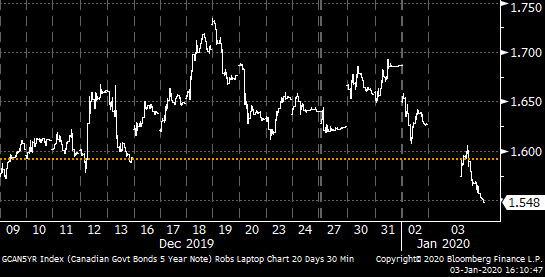Here’s reason #5,369 why we don’t like to predict interest rates: war.
Canada woke up this morning to the leader of Iran’s Revolutionary Guards’ Quds force being incinerated by a U.S. bomb.
Iran’s Supreme Leader promised “severe retaliation” — whatever that means — and just like that, bond yields plunged. It was completely unpredictable.

When global risk escalates, traders instinctively rush to buy bonds. That extra demand pushes up bond prices, which pushes down bond yields (since bond prices and rates always move inversely).
Falling yields, as most readers know, lead to falling fixed mortgage rates. Sometimes, if yields drop far enough, it also presages a drop in variable rates (if the Bank of Canada has to cut rates to ward off economic weakness).
Apart from this “flight to safety,” as trader-types call it, war has another effect. If the government spends billions of dollars on war, it can crowd out spending on things that better grow the economy, like infrastructure.
If GDP growth falls as a result, that too is depressing for mortgage rates—as is monetary policy easing, which may be required to prop up consumer sentiment.
Longer term, however, financing war with deficits can theoretically be bullish for rates. And there’s always the chance that a Middle East crisis could spike oil prices so high that inflation temporarily rockets higher and forces the Bank of Canada to boost interest rates.
What’s Next?
Who knows what this new Iranian-U.S. showdown will lead to, but we all know this: President Trump loves showing strength. And it takes very little prodding for him to do so, by force.
 So, if Iran’s Ayatollah is brazen enough (suicidal enough?) to engage the U.S. military, as Bloomberg News puts it, “the U.S. and Iran could be drawn into an armed confrontation that could easily pull in other countries.”
So, if Iran’s Ayatollah is brazen enough (suicidal enough?) to engage the U.S. military, as Bloomberg News puts it, “the U.S. and Iran could be drawn into an armed confrontation that could easily pull in other countries.”
At the very least, this latest geopolitical hazard could weigh on rates for a while. Investors are less likely to sell bonds and push up rates while clouds of uncertainty hover overhead.
The 5-year bond yield will probably have to close above 1.75% for the next round of fixed-rate hikes. We’re now suddenly 20 basis points below that number, and counting.
Long story short: If you were looking for another reason to pick a floating rate for your mortgage, hopefully this isn’t it. But there’s at least a small chance it might be.

 log in
log in
5 Comments
Why would oil price inflation by itself warrant an increase in the overnight rate? I thought BoC policy was to increase the overnight rate primarily in response to chronic inflation due to an overheated economy. Temporary factors external to the Canadian economy like global oil prices aren’t supposed to have much influence on policy decisions.
Hi Ralph, As Liam suggested, oil price shocks can warrant action by the BoC. This occurs when such shocks cause inflation expectations to become un-anchored. This has happened in the past — despite some believing that the price spikes in crude would be temporary.
Ralph: Look at a chart of oil, inflation and the Bank of Canada’s policy rate in 1979 and 2007-2008. That should answer your question.
War, huh, yeah
What is it good for
Absolutely nothing … except maybe lower mortgage rates.
It’s good for investors long crude
and the oil industry
and the loonie
and electric car manufacturers
and Alberta’s government
and the Saudis